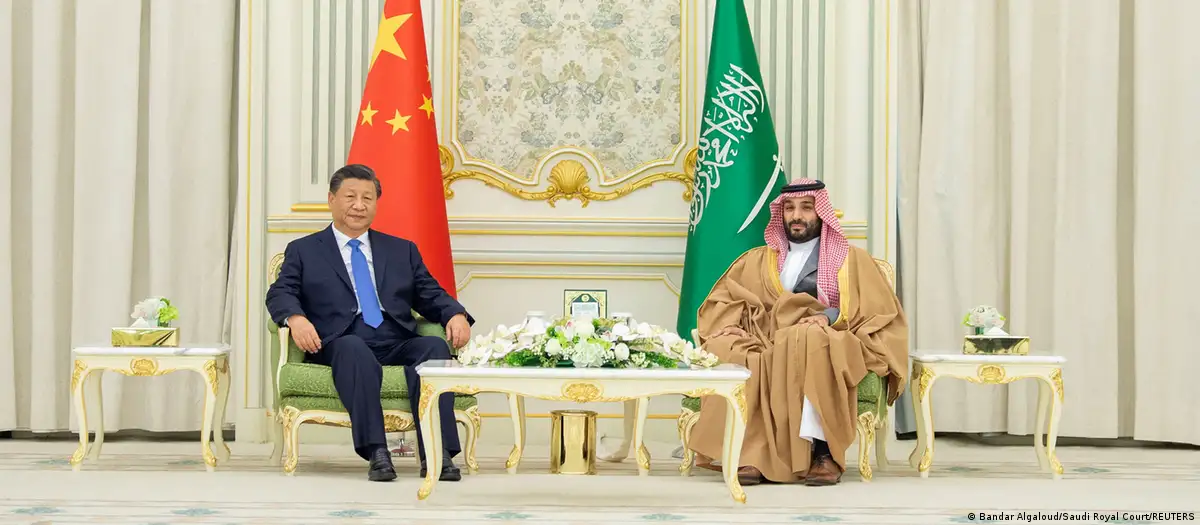Some US computer chip shipments to the Middle East are banned. Intended to prevent AI-enabling chips from reaching China. No one knows which countries or how chips will reach China. Over a month ago, a major US IT company made a strange announcement.

The chips produced by Nvidia are known as “the new oil” because of the fact that they process data at a significantly faster rate and are currently so lucrative. (Source: DW)
AI Development Through Computer Chips
Nvidia, which makes the world’s most powerful computer chips, said the US government was blocking exports to “some Middle Eastern countries.” Nvidia did not specify affected nations or reasons. However, many saw it as the start of the “tech war” between China and the US in the Middle East. The US has been racing China to create world-changing artificial intelligence (AI) technology. Recent attempts to impede Chinese AI advancement include restricting access to computer chips and semiconductors essential for advanced AI models.
Without these, AI development is difficult, and most US businesses, including market leader Nvidia, make them. The US Department of Commerce restricted advanced semiconductor exports to China and Russia last year for that reason. August’s announcement broadens export prohibitions. Nvidia and the US government are silent. There are some likely candidates. “My best guess as to the countries under closest scrutiny are Iran, Saudi Arabia, and UAE,” said American University in Washington professor John Calabrese, who writes frequently about China’s Middle East activities. “Iran excels at ‘hacking’. Saudi Arabia and the UAE can afford it. Qatar and Israel were maybe mentioned. All of these cases seem to have a ‘national security’ basis.”
Global AI spending is highest in oil-rich Gulf states. Saudi Arabia, the UAE, and Qatar view digital transformation as crucial to diversifying away from oil exports. Other Middle Eastern countries investing heavily in AI include Israel. Most of the world’s advanced chipmakers work there. Nvidia bought Mellanox, an Israeli firm, in 2020, making it its largest non-US business. The US government called AI-enabling chips “technologies that are force multipliers for military modernization and human rights abuses.” Announcing export restrictions.
READ ALSO: The U.S.-China Trade Relations
China Computer Chip Trading
Reuters reported on China’s underground sophisticated chip trading in June. Chinese vendors stated they acquired chips from Indian, Taiwanese, and Singaporean companies. In the Middle East, countries investing extensively in AI have increased their connections with China over the past five to 10 years, which could lead to leakage. In an August 2023 report, Carnegie Endowment researchers found that Saudi Arabia’s tech and scientific cooperation with China had grown for seven years.
King Abdullah University of Science and Technology (KAUST) has many Chinese students and faculty. The Carnegie Endowment study observed that personal connections between KAUST and mainland China research organizations had increased cooperation. Dubai has a similar AI situation. It created a Ministry of AI in 2017 and has Falcon, a sophisticated AI model. Meanwhile, Emiratis are seen as untrustworthy. European, US, and UK officials visited the country in early September to discourage the Gulf state from transferring sanctioned commodities to Russia. Chips that enable AI are included.
“None of this is to say that the US thinks the UAE and Saudi Arabia will intentionally deliver such technology to China and Russia,” Middle East Institute (MEI) strategic technologies and cyber security program head Mohammed Soliman told DW. He stated that both countries value the US and wouldn’t want to cause conflict. “Given Russia and China’s increased presence in Gulf nations, US officials are probably more concerned that Nvidia chips are more vulnerable to espionage, reverse-engineering, or unintentional transfer,” he said. China-Israel relations are also growing. Chinese investors have financed local chip-maker venture capital firms and Huawei and Xiaomi operate research centers there.
In recent years, US computer corporations like Intel have leveraged their Israeli locations to ship semiconductors to China. In 2019, technology researcher Danit Gal wrote for the US Council on Foreign Relations. “China’s demand for alternative commercial technology trade partners in light of tightening American trade restrictions is an unexpected economic boon to Israel,” she said. Gal warns that Israel’s position would be noticed by Washington because of the significance of chips for military and technical growth.
Israel may need to reconcile its Chinese investors with its American ally’s demands, but MEI’s Soliman doesn’t think the new export limits will apply.
READ ALSO: China Might Use TikTok Data Against US

















































